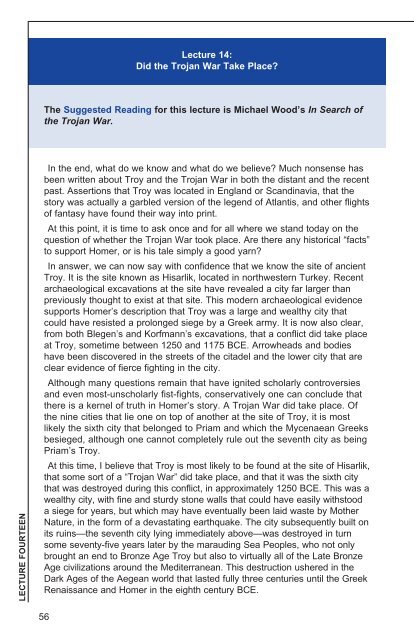The Trojan War in Homer and History - Recorded Books
The Trojan War in Homer and History - Recorded Books
The Trojan War in Homer and History - Recorded Books
Create successful ePaper yourself
Turn your PDF publications into a flip-book with our unique Google optimized e-Paper software.
LECTURE FOURTEEN<br />
Lecture 14:<br />
Did the <strong>Trojan</strong> <strong>War</strong> Take Place?<br />
<strong>The</strong> Suggested Read<strong>in</strong>g for this lecture is Michael Wood’s In Search of<br />
the <strong>Trojan</strong> <strong>War</strong>.<br />
In the end, what do we know <strong>and</strong> what do we believe? Much nonsense has<br />
been written about Troy <strong>and</strong> the <strong>Trojan</strong> <strong>War</strong> <strong>in</strong> both the distant <strong>and</strong> the recent<br />
past. Assertions that Troy was located <strong>in</strong> Engl<strong>and</strong> or Sc<strong>and</strong><strong>in</strong>avia, that the<br />
story was actually a garbled version of the legend of Atlantis, <strong>and</strong> other flights<br />
of fantasy have found their way <strong>in</strong>to pr<strong>in</strong>t.<br />
At this po<strong>in</strong>t, it is time to ask once <strong>and</strong> for all where we st<strong>and</strong> today on the<br />
question of whether the <strong>Trojan</strong> <strong>War</strong> took place. Are there any historical “facts”<br />
to support <strong>Homer</strong>, or is his tale simply a good yarn?<br />
In answer, we can now say with confidence that we know the site of ancient<br />
Troy. It is the site known as Hisarlik, located <strong>in</strong> northwestern Turkey. Recent<br />
archaeological excavations at the site have revealed a city far larger than<br />
previously thought to exist at that site. This modern archaeological evidence<br />
supports <strong>Homer</strong>’s description that Troy was a large <strong>and</strong> wealthy city that<br />
could have resisted a prolonged siege by a Greek army. It is now also clear,<br />
from both Blegen’s <strong>and</strong> Korfmann’s excavations, that a conflict did take place<br />
at Troy, sometime between 1250 <strong>and</strong> 1175 BCE. Arrowheads <strong>and</strong> bodies<br />
have been discovered <strong>in</strong> the streets of the citadel <strong>and</strong> the lower city that are<br />
clear evidence of fierce fight<strong>in</strong>g <strong>in</strong> the city.<br />
Although many questions rema<strong>in</strong> that have ignited scholarly controversies<br />
<strong>and</strong> even most-unscholarly fist-fights, conservatively one can conclude that<br />
there is a kernel of truth <strong>in</strong> <strong>Homer</strong>’s story. A <strong>Trojan</strong> <strong>War</strong> did take place. Of<br />
the n<strong>in</strong>e cities that lie one on top of another at the site of Troy, it is most<br />
likely the sixth city that belonged to Priam <strong>and</strong> which the Mycenaean Greeks<br />
besieged, although one cannot completely rule out the seventh city as be<strong>in</strong>g<br />
Priam’s Troy.<br />
At this time, I believe that Troy is most likely to be found at the site of Hisarlik,<br />
that some sort of a “<strong>Trojan</strong> <strong>War</strong>” did take place, <strong>and</strong> that it was the sixth city<br />
that was destroyed dur<strong>in</strong>g this conflict, <strong>in</strong> approximately 1250 BCE. This was a<br />
wealthy city, with f<strong>in</strong>e <strong>and</strong> sturdy stone walls that could have easily withstood<br />
a siege for years, but which may have eventually been laid waste by Mother<br />
Nature, <strong>in</strong> the form of a devastat<strong>in</strong>g earthquake. <strong>The</strong> city subsequently built on<br />
its ru<strong>in</strong>s—the seventh city ly<strong>in</strong>g immediately above—was destroyed <strong>in</strong> turn<br />
some seventy-five years later by the maraud<strong>in</strong>g Sea Peoples, who not only<br />
brought an end to Bronze Age Troy but also to virtually all of the Late Bronze<br />
Age civilizations around the Mediterranean. This destruction ushered <strong>in</strong> the<br />
Dark Ages of the Aegean world that lasted fully three centuries until the Greek<br />
Renaissance <strong>and</strong> <strong>Homer</strong> <strong>in</strong> the eighth century BCE.<br />
56






